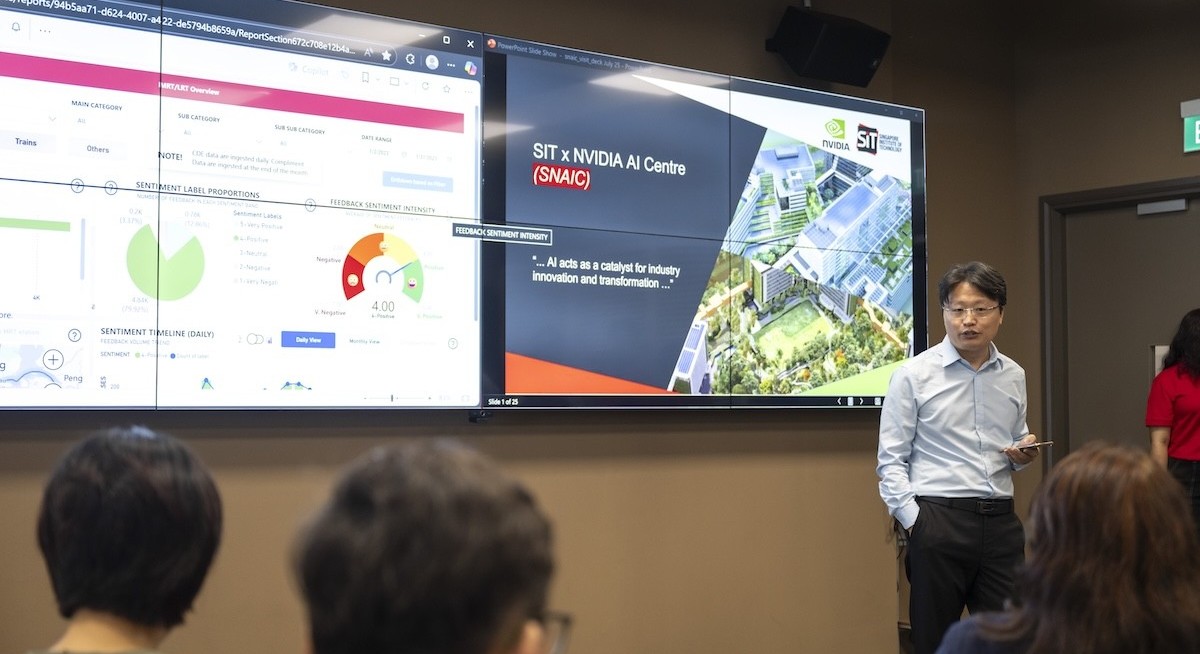Behind the scenes, SMRT has developed an AI-Driven Intelligent System (AiDiSA) that uses a custom AI model to process commuter feedback. The system improves sentiment analysis accuracy and reduces case-assignment workload, enabling faster responses for public transport operations.
Both initiatives were co-developed with the Singapore Institute of Technology x Nvidia AI Centre (SNAIC), a facility launched today at SIT’s Punggol campus. Since its construction was announced in April 2024, SNAIC has initiated more than 50 projects and forged over 20 industry partnerships, including with SMRT and insurer Prudential, to translate AI research into practical applications.
“SNAIC demonstrates SIT’s commitment to translating applied learning into tangible outcomes for industry. By combining our applied learning approach with Nvidia’s AI expertise, we are co-developing solutions to real-world challenges while bridging the gap between AI research and enterprise applications,” says Professor Susanna Leong, vice president for Applied Research at SIT.
Strengthening the human capital
See also: Microsoft’s new programme targets faster AI rollouts in Singapore
SNAIC is also focused on developing a pipeline of talent. The SNAIC AI Programme —developed with the Infocomm Media Development Authority under the TechSkills Accelerator framework — will train more than 200 practitioners over three years.
Open to graduates and mid-career professionals from diverse industry backgrounds, the six-month programme is designed for those with foundational skills in programming, machine learning and data technologies, and a strong motivation to adopt AI as a complementary skill set for their careers.
It blends intensive coursework with hands-on industry projects, supervised by SIT and SNAIC experts. Participants will gain skills in generative AI, large language models, retrieval-augmented generation and agentic AI, and will earn stackable micro-credentials under SIT’s Competency-based Stackable Microcredential Pathway, which can be applied toward a Bachelor's degree.
See also: AI race: Alphabet, Amazon, Meta and Microsoft set for US$650 bil capex this year
Beyond training practitioners, Singapore also aims to develop “AI bilingualists” or professionals such as radiologists, accountants and lawyers who are experts in their fields and able to speak the “language of AI,” says Josephine Teo, Singapore's Minister for Digital Development and Information, at SNAIC’s official launch earlier today.
This blend, she argues, allows domain specialists to provide critical context that data scientists or machine learning engineers alone cannot. “Our AI ecosystem will need AI bilingualists at different levels of mastery, and we are systematically identifying opportunities to develop them,” she says.
To nurture such AI bilingualists, SIT has established the Applied AI Doctoral Training Centre (AAIDTC). The centre anchors applied AI research across the university and will train 10 industrial doctorate candidates annually.
Each candidate will work with an industry partner on complex multi-year projects that cannot be addressed with off-the-shelf tools. The programme is designed both for working professionals tasked with AI innovation and fresh graduates aspiring to push the frontiers of applied AI.
Beyond Singapore, SNAIC’s partnerships with Monash University in Australia, Chulalongkorn University in Thailand and VNU-UEL in Vietnam extend its regional reach. These collaborations include talent exchange, joint seminars and cross-border research projects aimed at solving industry challenges. By anchoring such partnerships, SNAIC is positioning itself as a hub for applied AI collaboration across Asia.
“Initiatives such as the Applied AI Doctoral Training Centre, the SNAIC AI training Programme with IMDA, and our strategic collaborations with industry and overseas universities strengthen Singapore’s ability to diffuse AI effectively across sectors and drive innovation at scale,” says SIT’s Leong.




